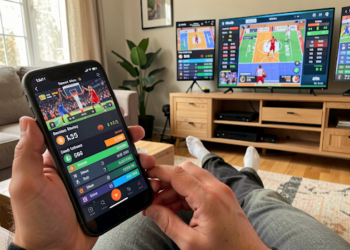Let’s be honest, when it comes to predicting sports outcomes, most of us have been there. You’re convinced your team will win because they just have to. Or you’re riding a hunch because the striker “looked confident in warmups.” But whether you bet with your gut or with a spreadsheet full of stats, there’s one thing we all want: to be right.
These days, tools like bookmakers help casual bettors explore both angles, intuition and research, making sports predictions feel a little less like a shot in the dark and a little more like a game plan.
Let’s explore what really goes into “predicting” sports, and how to do it smarter, without taking the fun out of it.
Is It Really Just Luck?
Sure, there’s always an element of luck in sports. A bad call, an injury, or a last-minute goal can flip everything. But here’s the thing: predicting games isn’t only about luck. It’s about spotting patterns, understanding momentum, and paying attention to the small stuff.
If you know that a certain tennis player struggles on clay courts, that’s useful. If a football team always underperforms after international breaks, that’s insight. These are small details that many fans already pick up, without even realizing it.
The Case for Research
Sports fans are data collectors by nature. Whether you’re tracking goals, assists, corner kicks, even red cards, you’re already doing basic analytics.
Using platforms like bookmakers lets you compare odds, look at form guides, and see where the smart money is going. No need to turn into a professional tipster, just reading a little deeper than the headlines can go a long way.
Things worth looking at before placing a bet:
- Recent form (last 5 matches)
- Head-to-head history
- Home vs away performance
- Weather conditions (yes, really!)
- Team news: injuries, suspensions, rest days
but picking a few key ones can shift your guesses from hopeful to informed.
What About Gut Feeling?
Here’s the twist: sometimes your gut is right.
Maybe you’ve followed a team for years, and you can feel when they’re off rhythm. Or you’ve spotted a rising star before the bookies have caught on. That kind of intuition comes from experience, and it’s a totally valid part of betting.
The key is balance. Relying only on feelings can lead to emotional betting. But ignoring your instincts completely can make betting feel robotic. Mixing the two is where the magic happens.
When Predictions Go Wrong
You’ll never be right 100% of the time, and that’s okay.
A smart bettor knows when to walk away, when to laugh it off, and when to not bet at all. That self-control is often more important than any stat or insider tip. Ask yourself:
- Am I betting because I’ve done my homework?
- Or because I want something to happen?
That small pause before placing a bet is a powerful thing.
Use the Right Tools
Modern platforms make betting feel less like guesswork and more like strategy. With websites like bookmakers, you can:
- Compare odds across bookies
- Get real-time updates on games
- Learn about different types of bets
- Read insights without drowning in jargon
Having the right tools doesn’t guarantee you’ll win, but it absolutely helps you bet smarter.

Final Thought
Predicting sports isn’t about knowing the future. It’s about reading the present a little better than most people. Whether you’re relying on stats, gut, or both, it should always feel fun, not stressful.
So next time you’re tempted to place a bet based on your friend’s “sure thing” or your own superstition, take a second. Check the facts, trust your instinct, and play with awareness.
Because the real art of predicting sports? It’s the sweet spot between the numbers and the nuance.









